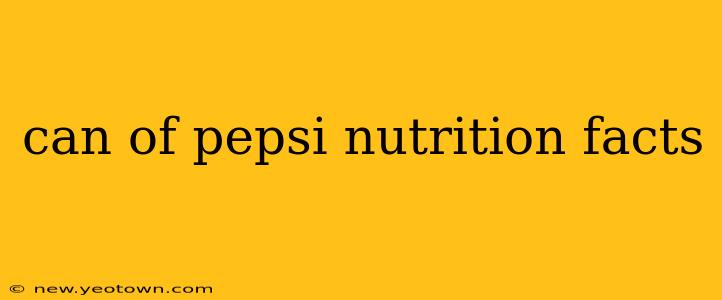Let's be honest, sometimes the irresistible fizz of a Pepsi is hard to resist. But before you crack open that can, you might be curious about what exactly you're consuming. Understanding the nutrition facts is key to making informed choices about your diet. This isn't just about calories; we'll explore the components within that familiar can and answer some common questions.
What are the Calories in a Can of Pepsi?
A standard 12-ounce can of Pepsi contains approximately 150 calories. This is primarily derived from the sugar content. Remember that calorie counts can vary slightly depending on the specific formulation and even the manufacturing plant, but 150 is a safe baseline. This calorie count is crucial to consider as part of your overall daily intake. If you're watching your weight, keeping tabs on these seemingly small additions can make a big difference over time.
How Much Sugar is in a Can of Pepsi?
The sweet taste of Pepsi comes largely from its sugar content. A 12-ounce can typically contains around 41 grams of sugar. That's about 10 teaspoons! This high sugar content is something many people are conscious of these days, given the link between added sugar and various health concerns.
What are the Other Ingredients in Pepsi?
Beyond sugar, Pepsi contains carbonated water, caramel color, phosphoric acid, caffeine, and natural flavors. While these ingredients might seem innocuous, let's break them down:
- Caramel color: This provides the iconic dark brown color.
- Phosphoric acid: Acts as an acidulant, providing tartness and balancing the sweetness.
- Caffeine: Pepsi contains a moderate amount of caffeine, providing a slight stimulant effect for many.
- Natural flavors: This is a broad category that encompasses a variety of compounds that contribute to Pepsi's distinctive taste profile. The exact composition is often considered a trade secret.
It's important to note that Pepsi, like many sodas, lacks significant nutritional value. It doesn't provide substantial vitamins, minerals, or fiber.
Does Pepsi Have Artificial Sweeteners?
Traditional Pepsi does not contain artificial sweeteners. The sweetness comes solely from sugar. However, PepsiCo offers diet versions of Pepsi, like Diet Pepsi, which utilize artificial sweeteners to reduce the sugar and calorie content. The nutritional profile of these diet versions will differ significantly from regular Pepsi.
Is Pepsi Gluten-Free?
Yes, Pepsi is generally considered gluten-free. The ingredients typically used in its production do not contain gluten. However, it's always advisable to check the label to ensure there hasn't been any cross-contamination during manufacturing.
How Does Pepsi Compare to Other Sodas?
Pepsi's nutritional profile is fairly typical of other cola-type soft drinks. Calorie and sugar content are generally similar across leading brands. However, specific formulations might result in minor differences. The best way to compare is always to check the individual nutrition labels.
Conclusion: Making Informed Choices
Understanding the nutrition facts of Pepsi allows you to make conscious decisions about your consumption. While enjoying a can occasionally might not pose a significant health risk for many, regular and excessive consumption due to its high sugar content warrants consideration. Moderation is key, and being aware of the nutritional breakdown helps you incorporate Pepsi into your diet responsibly. Remember that this information is for general knowledge and always refer to the latest nutrition label on the product for the most accurate and up-to-date information.

